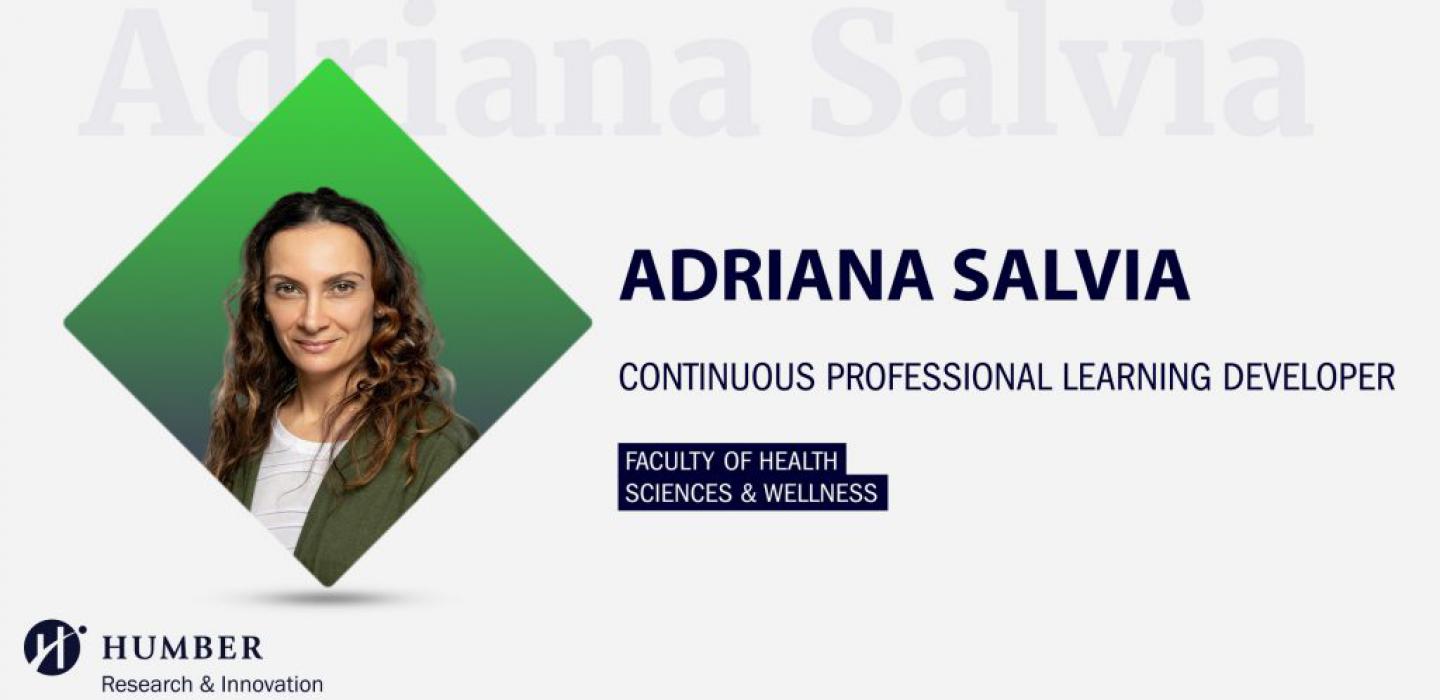We met with Adriana Salvia, Continuous Professional Learning Developer in the Faculty of Health Sciences & Wellness, to discuss the learnings and observations that emerged from her study with the Teaching Innovation Fund (TIF), enabled by the Scholarship of Teaching and Learning (SoTL) at Humber College.
The fundamental purpose of SoTL research is to advance, enhance and enrich the quality of teaching and learning at Humber. TIF supports faculty research projects that examine an element of the teaching and learning practice—taking a project or study from ideation to final analysis and interpretation—through building a new tool for use in the classroom or by measuring the impact of a new teaching method on students’ learning.
CTW Pilot Study
The Caregiver Training Workshop (CTW) Pilot Study aimed to advance knowledge about in-person educational interventions for family caregivers caring for ill adult recipients (18 years of age and over) at home. The targeted population was chronic disease caregivers. Fourteen caregivers participated in the Workshop/Pilot Study in the fall of 2019. The sessions were offered once a week, over five weeks (mostly consecutive Saturdays); each session lasted two hours. The content was delivered by a multidisciplinary team of Humber faculty members. The goal of the CTW Pilot Study was to measure any relationship between caregiver burden levels and the study’s multicomponent educational design.
CTW caregiver participant: “I learned that I am on the right track and that I am not alone.”
Humber Research & Innovation (R&I): Briefly explain the “raison d’etre” for undertaking this study
Adriana Salvia (AS): Like many others, I was thrust into a primary family caregiving role. It’s been nearly eight years that I have been a chronic disease caregiver to my spouse. I had been given a great deal of information about medications and assisting with daily living activities while my spouse was institutionalized, but there were countless things I had to figure out myself–too many to mention here–upon return home. Appreciating that level of responsibility, the prospect of doing something wrong, and him ending up in the hospital again was a lot to bear. This brief recap of my experience is an example of what caregivers often endure, and they do it alone, in the shadows, walking (and this is perhaps my favorite quote about chronic disease caregiving) an “unpredictable path”. I soon realized that there were few resources available to family caregivers, from formalized training to respite care, and it became my mission to investigate the following:
- What educational interventions had previously been tested with family caregivers?
- Is it possible to establish an optimal training program for family caregivers?
- What role does education play in helping caregivers manage their care situations at home?
Within the literature, “caregiver burden” is a term that is often attributed to the care situation, but it is certainly not the ideal description. What I know to be true personally, and is backed by the research, is that while caregiving is incredibly challenging, caregivers want to be there for their recipients, but they need knowledge, support, and acknowledgment. Theirs is a daily sacrifice and demonstrates the depth of their love and commitment to the recipient’s wellness. I suppose, in some ways, this endeavor of trying to determine how best to help caregivers maintain their own (and the recipient’s) wellness through training is a way of giving back to caregivers—and there are a lot of them. In Ontario alone, nearly 30% of the total population identify as family caregivers.
R&I: What was the gap identified and challenge addressed?
AS: Drawing on the research, it appeared that there were not enough multicomponent, skills-based educational interventions for family caregivers, specifically those caring for adult recipients with chronic illnesses or multiple chronic conditions. The challenges that we as researchers faced were structuring the CTW Pilot Study based on the best evidence available to date, as well as planning/logistics. The endeavor was for each caregiver to acquire generalized knowledge, skills, and training, while also having their unique care needs to be addressed.
R&I: What was the rationale behind the focus group selected?
AS: In researching the literature on educational interventions for family caregivers, the studies conducted typically focused on one type of illness experienced by the recipient. By opening eligibility to all chronic disease caregivers of adult recipients (per the list identified by the Public Health Agency of Canada, current as of 2019), the motivation was to be able to say ‘YES’ to as many people as possible who were interested in study participation. The research supports that the long-term nature of caring for a recipient with a chronic illness or multiple chronic conditions creates ongoing stress for the caregiver that could prompt recipient institutionalization before their actual need. There is a commonality of experience that chronic disease caregivers share, and yet each has specific care situations; the researchers wanted to see how this melding of experience could translate in the classroom.
CTW caregiver participant: “There are many more resources available than I thought. The feelings/experiences I have had are more universal than I thought.”
R&I: What were the main research methods used? Why did you choose them?
AS: The researchers opted for a Mixed Methods methodology and a Convergent design—which entails simultaneous collection of both quantitative and qualitative data, to see how either approach could explain potential discrepancies. Data collection occurred before session one, after session five, and three months post the Workshop/Pilot Study. The quantitative instrument of choice was the Burden Scale for Family Caregivers (BSFC). We used the long-form version consisting of 28 questions. This scale is specific to chronic disease caregiving; the form is completed by the caregivers and provides researchers with a subjective measure of their burden levels. This scale was administered at three different periods. It should be noted that research participation was voluntary and that the caregivers could take the CTW whether they elected to participate in the research study.
R&I: What were some of the topics addressed?
AS: Many of the topics addressed were those identified in the literature as important to family caregivers. Topics are not exhaustive here, and many could not be broached in intake one due to logistical factors. Some topics covered included coping, managing symptoms at home, managing medications, maximizing nutrition, and emergency skills.
R&I: Significant observations and lessons learned. Any unanticipated surprises?
AS: There were indeed observations made, particularly as we isolated the qualitative feedback from select participants. Those findings are outlined in greater detail in the final research report, but let’s just say that what appears to be a vital lesson here is that with this population, it is prudent to administer qualitative instruments rather than solely relying on quantitative data. Take the research context of significance. After running one intake of the Workshop/Pilot Study, we did not reach statistical significance, but with support from the qualitative feedback, we feel we are headed in the right direction in terms of improving the overall course design and structure.
R&I: Is the project/research study complete? Is there a next phase? Have you already incorporated any of the findings in the classroom?
AS: We had planned to offer a second intake of the face-to-face Workshop/Pilot Study in the spring of 2020 but were unable to do so due to the COVID-19 pandemic. As a result, we have focused our efforts on completing the final research report. This was the deliverable we decided upon as part of the Teaching Innovation Fund’s expectations of fund holders. In the future, we would be keen to conduct a second intake of the in-person Workshop to build on the intake one findings. This could position us to:
- better deliver content to the family caregiving population; and
- provide advisement to community providers, etc., about the educational needs of this population.
From there, it would be great to explore how lessons learned could translate to the online learning environment.
We acknowledge, with thanks, the pioneering studies that faculty members undertake as reflective practitioners. Such evidence-informed practices could benefit an internal or external investigator through the development of new learning methods such as this workshop/pilot study or create an opportunity for co-creation of new ideas to come; that is the noble cycle of reflective teaching.
CTW TIF Project Team:
Adriana Salvia, Investigator – Developer, Continuous Professional Learning, FHS&W
Craig MacCalman, Co-Investigator, Program Coordinator, Paramedic Program, FHS&W
Sandra Cop, Co-Investigator, Nursing Professor, FHS&W
Sue L’Europa, Co-Investigator, Faculty Scheduler, Faculty of Business
Note:
If you are interested in bringing forth a new idea for a Teaching Innovation Fund Project, please watch this space for the next Call for Applications in mid-September.
References:
2nd Annual Spotlight on Ontario’s Caregivers. (2019, November). Retrieved from https://ontariocaregiver.ca/wp-content/uploads/2019/12/Spotlight-on-ontarios-caregivers-2019_EN.pdf

